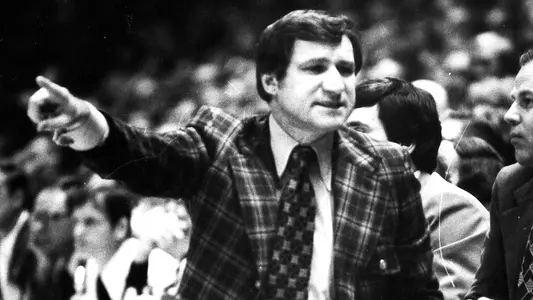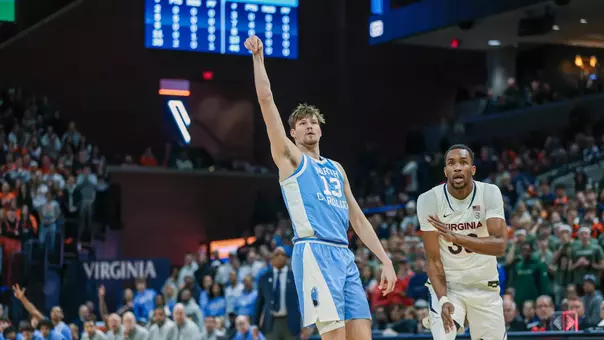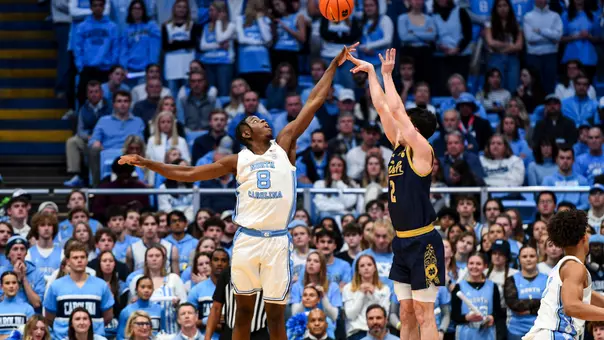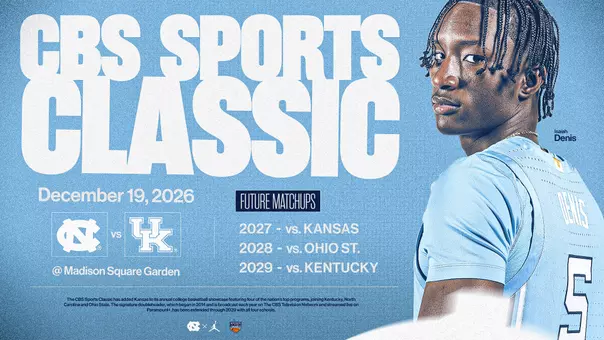University of North Carolina Athletics

Smith's Transition Not Always Smooth
February 12, 2015 | Men's Basketball
In July 2011, Tar Heel Monthly published a special Dean Smith commemorative edition. This story originally ran in that issue.
By Turner Walston
In the early 1960s, Harry W. Lloyd regularly appeared on the sports page of The Daily Tar Heel with his feature, “The Sports Tablloyd.” In it he offered news and notes from the world of sports, often along with his picks for that week's college sports contests. On April 9, 1961, Lloyd addressed rumors that men's basketball coach Frank McGuire might be leaving Chapel Hill for the New York Knicks. “Sooner or later,” Lloyd wrote, “readers in North Carolina will learn to laugh off these rumors that keep creeping into the headlines—the same way that Frank McGuire does.”
When McGuire and Carolina Basketball faced accusations of improper benefits from the NCAA earlier that year, the head coach sent assistant Dean Smith to answer for the program. Smith accompanied Carolina chancellor William Aycock to San Francisco to appear before an NCAA committee. When all was said and done, the NCAA levied a one-year probation and postseason ban on the program. Despite the sanctions, Aycock was impressed with Smith's acumen in going before the NCAA board. “The process of me working with Smith enlarged my knowledge of the kind of person he was,” Aycock says. “I wasn't worried about the basketball, because he wouldn't have been here if he didn't know basketball…I concluded that he was a man of great stature and personal good conduct and interested in the community and the people.”
After the NCAA ruling came down, rumors of McGuire's leaving for the NBA began to swirl. “Different people would tell me that he was negotiating with the Philadelphia Warriors,” Aycock says. McGuire asked to speak to Aycock, and the coach confirmed that he was leaving Carolina. As McGuire prepared to leave the chancellor's office, it occurred to Aycock that the coach might be interested in taking his young assistant with him. “I said, 'Before you go, I want to ask you a question. Do you mind if I talk to Dean Smith?'” Aycock recalls. “That told him a lot, that I was interested in Smith.” McGuire never let on if he had designs on taking Smith to Philadelphia. Aycock sent for Smith, and within 20 minutes, Smith was in the chancellor's office. “My memory is, he didn't sit down and we didn't start going through everything, I just wanted to know if he wanted to be the head coach, and he said he did.”
Aycock wasn't interested in conducting a national search for McGuire's replacement. The athletic department didn't have the money for that. Two years prior to hiring a new basketball coach, Aycock had acted similarly after the untimely death of football coach Jim Tatum. The day after Tatum's funeral, the chancellor interviewed football team captains, who said they preferred the next coach be promoted from within. Jim Hickey's fellow assistants unanimously recommended him as the next head coach, and Aycock followed their advice.
Willis Whichard was a freshman in 1958 when Dean Smith came on board as an assistant, and got to know the young coach. One Sunday evening in August 1961, Whichard and his wife, Leona, were walking back to Victory Village from the Cobb tennis courts and took a shortcut through Woollen Gym. “Dean Smith and Frank McGuire were standing in front of the trophy case in what was obviously a pretty intense discussion,” Whichard remembers. “[Smith] spoke to us, 'Hi, Bill. Hi, Leona. Did you have a good game?' As we got on around the corner, I turned to her and I said, 'There's something serious going on here. It's late afternoon on a Sunday when school is not in and those two are here in a very serious discussion.' The next morning, the headlines were that McGuire was going to the Philadelphia [Warriors] and Smith had been named the head coach.”
When The Daily Tar Heel resumed publication with start of the academic year the following month, the coaching change merited little fanfare. On September 16, Jim Clotfelter, an assistant to the editor, wrote a column titled Mourn not McGuire's Exit. In the column, Clotfelter sought not to introduce readers to the new head coach, but instead to calm the nerves of anxious Tar Heel basketball fans. “The Carolina basketball enthusiast must cease all wailing and face up to the existing and future situation,” he wrote. “As the de-emphasis program catches hold UNC will have teams of lesser ability than it has had in the past, McGuire or no McGuire. Since McGuire is the exceptionally good coach he is, he will be better off where basketball is taken more seriously, and this University will be better off not having a coach superior to its teams.” The name of McGuire's successor was nowhere to be found.
Whichard recalls conversations with a law student that summer following McGuire's departure: “All he could talk about was what a shame it was that Carolina would never have great basketball. I think the general reaction (of the student body) was that the university had done what they'd done when Jim Tatum died, just hired the assistant without really looking for a top-notch coach,” Whichard says. “I think the average Carolina fan was sad to see McGuire go because he'd been very successful and really wondered whether this was a de-emphasis of basketball, just picking this unknown 30-year-old assistant.”
In The Daily Tar Heel, Hickey's football team dominated the headlines that fall on their way to a 5-5 campaign. The first article devoted to basketball appeared on Halloween, “Basketball practices open Wednesdays at 8.” Weekly exhibition games between the freshman and varsity teams would be open to students. “They should be very interesting matches,” Smith said in his first quote as head coach. “Our freshman team is much stronger than it has been in several years, and the varsity may not be as strong as it has in the past.” The coach then suggested that fans come early to sit in the end zone, as sideline stands had not yet been erected.
Eight days later, a season preview article announced that Smith would mold his first team around the veteran trio of Jim Hudock, Don Walsh and Larry Brown. Smith's first game as head coach was an 80-46 win over Virginia. Lloyd called it “quite a successful opener” for Smith and his new “controlled offense.”
In September, Clotfelter had argued that after the point-shaving scandal spelled the end of the Dixie Classic, and with the university's self-imposed restrictions on recruiting and the number of games in a season, the expectations of Carolina basketball supporters ought to be modified. “The Gentleman of the Gym is gone and there should be a feeling of loss for the man, but not for the big-time competition he represented,” he wrote. “This is a new day in Carolina sports—for better or for worse—a new day with lesser teams, and both the University and McGuire have benefitted from his leaving.”
Five days after Clotfelter's column Lloyd's 'Tablloyd' had taken a more optimistic view that, with 50 years of hindsight, appears prescient. While Lloyd acknowledged the challenges facing the program, he wrote, “Basketball still appears to have a bright future in Chapel Hill. New coach Dean Smith and assistant Kenny Rosemond want a winner…Don't dig a grave for Carolina basketball. It's not even sleeping.”














